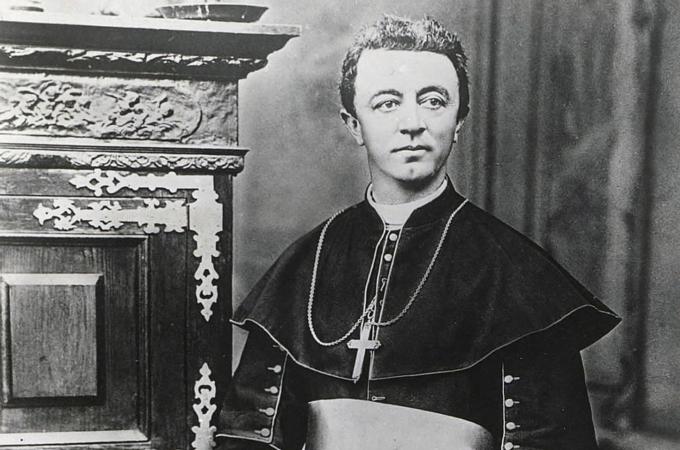The Bishop James Augustine Healy Dinner
Nov. 17 will mark the 25th Anniversary of the Bishop James Augustine Healy Dinner, held annually by the Black Catholic Ministries of the Archdiocese of Boston.
James Augustine Healy was born in 1830 in the State of Georgia to Michael Healy, an Irish immigrant, and Eliza Clark, an African American slave. Eliza legally belonged to Michael, one of the several dozen enslaved people living on his farm, and though their marriage had no legal standing, evidence suggests they lived together as husband and wife for the remainder of their lives.
The opportunities before James were limited since his status in antebellum society was determined by his mother's lineage, which led his father to send him and his siblings north. They attended Holy Cross College in Worcester, Massachusetts, where James graduated at the top of the first graduating class of 1849. He continued on to the Sulpician seminaries in Montreal and Paris, and was ordained a priest at the Cathedral of Notre Dame in 1854. He then returned to Boston, serving as the first chancellor of the diocese, helped to secure land for the current cathedral in the South End, and was later named the second bishop of the Diocese of Portland, Maine.
I had the pleasure of speaking with Ms. Lorna DesRoses, Coordinator of the Black Catholic Ministries for the Archdiocese of Boston, who spoke about the history of this community in the Archdiocese of Boston, and about what this dinner has come to represent over the past 25 years.
There was always a small black Catholic community in Boston, and in the 1920s the Sisters of the Blessed Sacrament, founded by St. Katharine Drexel, arrived in the diocese to minister to them. They first used the old St. Patrick Church in the South End, before establishing the Blessed Sacrament Mission Center and later St. Richard Church, both in Roxbury.
DesRoses reveals that in the 1970s and 1980s "there was a movement within the black Catholic community to begin to assert their identity as Catholics within the Church." This was done by making aspects of their own traditions and cultures part of their daily worship. Masses began to include music composed in gospel or spiritual style, and homilies and the liturgy were delivered in a way that connected with the congregation. There was visual evidence in the way Jesus and the saints were depicted, and the use of brightly patterned cloth for altar cloths and the priests' vestments.
Most importantly, DesRoses reflects, was the affirmation that "we are black, we are Catholic' and it's not a contradiction to say I am black and Catholic, this is an essential part of who I am as a person, and one does not negate the other." In other words, "I bring myself as a gift to the Church, I bring my culture as a gift to the Church."
This movement occurred primarily at the local level, but was embodied by a few national organizations such as the Black Catholic Clergy Caucus and National Black Sisters Conference in 1968, and the resumption of the National Black Catholic Congress in 1985. Locally, the Archdiocese of Boston looked to form a Black Catholic Advisory Committee during the 8th synod in 1988, which "was instrumental in coming up with the idea of having the Bishop Healy Award Dinner," DesRoses states.
The first Healy Dinner took place in 1993, with the inaugural Healy Award being given to Judge David S. Nelson, a native Bostonian who attended Boston College and Boston College Law School, before teaching at Harvard Law School, and later serving as judge for the United States District Court for Massachusetts. DesRoses indicates that the "mission was most definitely a way to highlight and bring attention to people within the community who were doing good work, exceptional work, (and offering) exceptional leadership."
In addition to honoring the award recipient, DesRoses emphasizes the important "sense of gathering, sense of people looking forward to seeing and being with one another, and celebrating not only the honoree but celebrating this community."
Other components of the dinner include the presentation of the Robert Leo Ruffin award, "named for a prominent black Catholic from Boston, who was one of the main supporters of the first black Catholic Congress held in 1889."
This year, Archbishop Wilton D. Gregory of the Archdiocese of Atlanta will be the guest speaker. And, finally, a theme, which is meant to reflect the current state of the Black Catholic Community -- this year's being "Standing Firm in our Faith."
The Black Catholic Ministries have several other upcoming events and DesRoses emphasized that everyone is welcome. She hopes that people will use these opportunities to reconnect with or strengthen their Catholic faith, saying that it is inspiring "hearing how people, or ordinary people, who are doing extraordinary things are living out their life of faith through service to the Church." There will be a special prayer service and breakfast on Martin Luther King Jr. Day at 9 a.m., and a special Mass in observance of Black History Month on Feb. 3 at 11 a.m. Both will be held at St. Katharine Drexel Parish in Roxbury.
For more information, please see: www.bostoncatholic.org/BlackCatholicMinistries.aspx.
- Thomas Lester is the archivist of the Archdiocese of Boston.



















